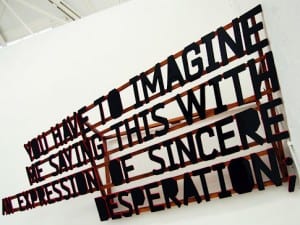Cornerhouse opens Anguish and Enthusiasm on 13 April, an extraordinary group show of new and recent contemporary art investigating post-revolutionary periods and events. Exploring contrasting perspectives and observations from Latin America, Eastern Europe, Asia and beyond, the exhibition considers politics, change and those who were lost along the way. Featuring new commissions by Sarah Pierce, Andreas Bunte, Mathieu Kleyebe Abonnec and Trust Your Struggle alongside existing work by an array of acclaimed artists including Eoghan McTigue, Pocas Pascoal and Jun Yang, Anguish and Enthusiasm will be accompanied by two Artist Film Forums showcasing shorts contributing to the exhibition’s themes, and events further investigating the outcome of a revolution.
The impact of the moment invariably overshadows the aftermath of an event. But while revolutions often serve as landmark shifts in the history of a nation, people or cause, it is the post-revolutionary period that reveals most about the mind-set and outlook of those that map the new terrain. Frequently followed by Civil Wars and purges, many ideological principles and people themselves fall by the wayside.
Curated by Declan Clarke and Sarah Perks, this exhibition takes its title from the third chapter of Victor Serge’s compelling book Memoirs of a Revolutionary, focusing on the period just after the Russian revolution and Civil War prior to the founding of the U.S.S.R. The author gives first-hand testimony of the transition from the initial euphoria of the revolution’s success to a growing unease about the manner in which the Bolsheviks began to implement their revolution.
Following the critically acclaimed socio-political exhibitions Contemporary Art Iraq (2010), New Cartographies (2011) and Subversion (2012), this Cornerhouse group show aims to explore the painful and divisive process of building a new society along the hastily prepared guidelines of a spontaneous uprising, and the bitter battle that emerges in the race for a new power elite.
Trust Your Struggle have been invited to re-paint a mural on a wall adjacent to Cornerhouse with the intention of reflecting on the unchanged situation of the black community in Oakland, which has suffered extreme police brutality since it was first highlighted by Newton and Seale in 1966. The project also attempts to regard the potential neglect of working class ethnic communities within Britain, and the dangers of neglecting a more evenly balanced and socially inclusive approach to rebuilding Britain in the current economic climate.
Eoghan McTigue’s photographic work Empty Sign (1998) depicts the notice board from Queen’s University in Belfast, cleared of content by the artist. Redolent of a mid-1950s abstract painting and with the traces of what was previously pinned to the board remaining, its bright red colour recalls the red flag of international socialism and the flag of the Paris Commune. Empty Sign recollects past radical traditions of students whilst presenting the potential of the notice board as a political space to be reactivated by contemporary university students, as central Europe again turns towards a period of division and upheaval. Queen’s University was a focal point of radical left-wing student activity throughout the 1960s and it was from its ranks that the students who set up the Derry Housing Action Committee emerged – this would later go on to become a key moment in the Civil Rights Movement in Northern Ireland (1969).
Pocas Pascoal’s Il y a quelqu’un qui t’aime (There Is Always Someone Who Loves You), (2003) is a poignant and deeply moving film work about her family’s experiences as the independence of Angola from Portugal was confirmed in 1975. After 14 years of the War of Independence (1961 – 1975), the country slipped into a brutal civil war between the three nationalist parties vying for power. Pascoal recounts the tense and violent environment she and her family find themselves in as her mother endeavours to transport her and her sister to safety. Concurrent with this is her recounting her attempts to track down her family home and determine what actually happened through the fractured recollections of her 12 year old younger self, capturing the trauma and bitter reprisals that overwhelm people as they make the transition from occupation to self-rule.
Artist Sarah Pierce will introduce Gag, a new work commissioned by Cornerhouse. Her performance, result of a year-long project specifically for the exhibition, deals with ‘inhibitions of return’ (loss of a demand, loss of speech, lost meaning) and the suppression of objects and events that had recently been the focus of attention.
Anguish and Enthusiasm: What Do You Do With Your Revolution Once You’ve Got It, 13 April until 18 August, Cornerhouse, 70 Oxford Street, Manchester, M1 5NH. www.cornerhouse.org
Credits:
1. Pocas Pascoal, Il y a quelqu’un qui t’aime (2003). Courtesy Cornerhouse
2. Eoghan McTigue, Empty Sign (1998). Courtesy Cornerhouse.





